10 Days Lhasa to Everest Base Camp and Namtso Lake Small Group Tour
Tour Route: Lhasa - Gyantse - Shigatse - EBC - Shigatse - Lhasa - Namtso Lake - Damxung - Lhasa

 Tour Code: SG001B
Tour Code: SG001B
 Tour Type: Join-in Small Group Tour (Min 1 to Around 12) i
Tour Type: Join-in Small Group Tour (Min 1 to Around 12) i
- Guaranteed Departures: Our tour dates are fixed, ensuring each departure is guaranteed.
- Flexible Scheduling: If you can't find a date that suits your travel plans, no need to worry. Simply let us know your preferred travel time, and we'll create a custom schedule, inviting others to join you.
- Non-shopping Experience: Embrace a non-shopping adventure with us. We promise high-quality tours, ensuring an authentic and enriching experience in Tibet.
 Tour Service:
Tibetan Local Tour Guide & Driver
Tour Service:
Tibetan Local Tour Guide & Driver
 Time to Vist:
Available All Year Around i
Time to Vist:
Available All Year Around i
- The best time to explore Mt. Everest are April, May, June, September, October, and November, offering pleasant temperatures for a comfortable experience.
- The busiest times/peak season are July, August, and October 1-8, coinciding with peak holiday seasons.
- From December to March marks Tibet's winter, an off-peak season. Despite this, Mt. Everest enjoys clear weather during these months, providing excellent visibility. It's the perfect time to witness the stunning sunset and sunrise at Mt. Everest, with lower prices making it an affordable option.
 Trip Level:
Easy Trip for All Ages i
Trip Level:
Easy Trip for All Ages i
- Our youngest client of the Mt.Everest trip is 3 months and seasoned explorers reach up to 86 years! For your well-being, if you have any health issues, we recommend consulting your doctor for expert advice.

Travel along the most beautiful highway to Tibet and go in-depth to the Himalayan regions of Tibet in one go.

10 Days from USD1688
- This price is based on double occupancy;
- This price is based on 3-star accommodation level in low season;
- This price doesn’t include the international airfare.
Overview & Highlights of this Trip
This 10-day Lhasa to Everest Base Camp and Lake Namtso tour is a thrilling odyssey, offering some of the most captivating Tibetan experiences that the region has to offer.
Starting from Lhasa, the journey unfolds as you delve into the holy city before embarking on a westward drive to Tingri, the gateway of the Everest region. You will pass through glaciers, lakes, farmlands, villages, and monasteries, reaching the depths of the Himalayas at the Everest Base Camp (5200m). Witness breathtaking sunrises and sunsets and gaze upon the stars from the top of the world.
Then, you will extend your journey to Damxung Grassland, located 220 kilometers north of Lhasa, where the enchanting Namtso Lake awaits. Marvel at the vastness of Lake Namtso, resembling a sea embraced by the boundless Nyechen Tanglha Mountain. Amidst the grasslands of northern Tibet, encounter scattered local nomads tents, and flocks of yaks and sheep.
This is not only an overland journey across the Tibetan Plateau but also an unforgettable experience to discover the breathtaking natural landscapes with the rich tapestry of humanity.

Highlight 1 of this Trip: Stay overnight at the Everest Base Camp in Tibet and enjoy sunrise and sunset over Mt.Everest.

Highlight 2 of this Trip: Admire the Potala Palace, the UNESCO World Heritage Site and the landmark of Lhasa.

Highlight 3 of this Trip: Follow the ancient Barkhor Kora route around the Jokhang Temple.
Itinerary Details
Trip at a Glance
Day 1: Welcome to Lhasa (3650m)!
Day 2: Lhasa Tour - Drepung Monastery and Sera Monastery (B, D)
Day 3: 第3天
Day 4: 第5天
Day 1: Welcome to Lhasa (3650m)!
Welcome to Lhasa (3650m)!
When you arrive in Lhasa, whether by train or flight, our friendly Tibetan guide will greet you with a Hada (the traditional Tibetan ceremonial scarf) and warm blessings.
Then, the guide and the driver will take you to your hotel in downtown Lhasa. You may view the Yarlung Tsangpo River/Brahmaputra River (the Longest and largest river in Tibet) and Lhasa River.
After settling into your hotel, take some time to rest and adjust to the high altitude.
In the afternoon or evening, your guide will meet you with traditional Tibetan gifts, provide travel instructions, and introduce your group members.
If you need any help or specific needs, feel free to visit our service center at Lhasa Gang-Gyan Hotel.
Stay overnight in Lhasa.
 Overnight in Lhasa
Overnight in LhasaDay 2: Lhasa Tour - Drepung Monastery and Sera Monastery (B, D)
Today is Tibetan Monastery Day! You’ll have a full day to explore the largest monastery in Tibet, delve into the knowledge of Tibetan Buddhism, and immerse yourself in the daily life of Tibetan monks.
In the morning, you’ll explore the largest monastery in Tibet - Drepung Monastery, which was once the home to over 10,000 monks. As you walk through the Coqen Hall, your guide will provide detailed explanations of the worldview of Tibetan Buddhism and introduce notable figures in Tibetan Buddhist history.
Next, you’ll visit the renowned Loseling College (or an equivalent), offering a glimpse into the study and life of Tibetan monks. Explore their dormitories to gain insights into the Tibetan monks' daily routines and living conditions.
In the afternoon, you’ll head to Sera Monastery, another of the ‘great three’ Gelug monasteries of Tibet, to witness the famous Tibetan Monks Debate (15:00 - 17:00, from Monday to Saturday). Your guide will intricately explain how Tibetan monks engage in these debates to acquire knowledge and advance in their academic degrees.
After today’s tour, enjoy a welcome dinner with your group members.
 Overnight in Lhasa
Overnight in Lhasa Lunch,Dinner
Lunch,DinnerDay 3: 第3天
Day 4: 第5天
Tour Cost & Schedule
| Starting Date | Price From | Booked | Book Now |
|---|
Please Note:
If you couldn’t find a tour date suitable for your travel schedule in the above form, please contact our travel experts and they will help you plan a delightful vacation to Tibet at the BEST local price.
Discount:
1.) 5% off for those booking the tour together with other two travelers (3 or 3 above in total) at the same time;
2.) 5% off for those booking the tour 3 months in advance.
3.) Please kindly be aware that the two discounts mentioned above cannot be enjoyed simultaneously.

From Tibet travel permits to local accommodations and transportation, we've got you covered. While train and flight tickets to Tibet are not included, we ensure seamless and 100% guaranteed booking for your convenience.
Your Tibet tour experience starts with us!
Price Inclusions:
Tibet Travel Permit and all required local travel documents for this tour (excluding expedited processing fees); Local tour transfers, 5-29 seats comfortable tourist vehicle according to the group size; All entrance ticket fees for all tourist sites listed in the itinerary; All meals listed in the itinerary; Knowledgeable English-speaking Tibetan local tour guide shared in your group (For prices of tour guides in other languages, please inquire); All hotels listed in the itinerary or equivalent three-star hotels. Upgrades are available for an additional fee. (Single room supplement required when not sharing the room); Free shuttle between Lhasa Railway Station and the downtown hotel according to your arrival/departure time. Free shuttle between Lhasa Railway Station/Lhasa Gonggar Airport and the downtown hotel; Service Charge & Government Taxes; Arrangements including planning, handling, operational, and communication charges; Tourist accident/casualty insurance; Additional services include fine Tibetan souvenirs, a tourist map, portable oxygen, medical oxygen in the vehicle, bottled mineral water, and more.
Price Exclusion:
China Visa (If you need visa assistance services, especially for Chinese Group Visa from Nepal to Tibet, feel free to contact us for more details.); International flight to and out of China; Domestic flight/train to and out of Lhasa (If you need us to book the domestic flight/train tickets, please contact us for the details.); Single Room Supplement: Hotels default to double occupancy with twin-bedded rooms. If you prefer a single room or room sharing isn't possible, a single room supplement is necessary. Please consult the travel consultant for specific pricing details. Meals not listed in the itinerary; Tips for the guide and driver. If you are satisfied with their service, it is suggested to tip $7 (50 RMB) per day per person to be shared between the driver and the guide; Other expenses caused by force majeure events (such as natural disasters, traffic control, loss of valuables, visa delays, flight delays or cancellations, etc.); Personal expenses, like laundry, phone calls, snacks, soft drinks (please do your best to avoid alcoholic beverages during your Tibet trip), optional tour activities, etc.
Contact us for your dream trip now !
Enquire NowYou May Also Like:







 View Trip Map
View Trip Map
 5.0
5.0 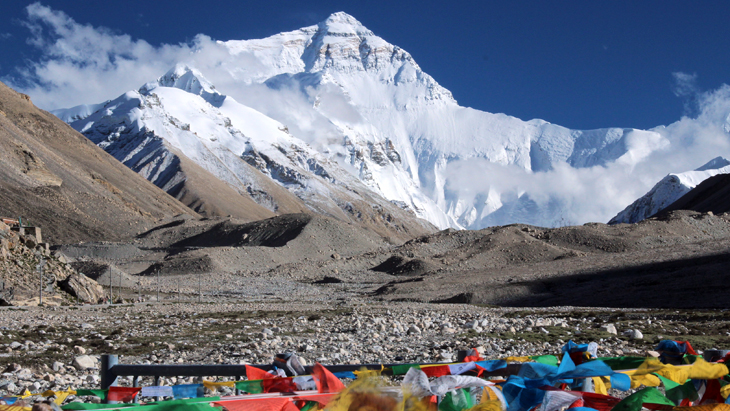
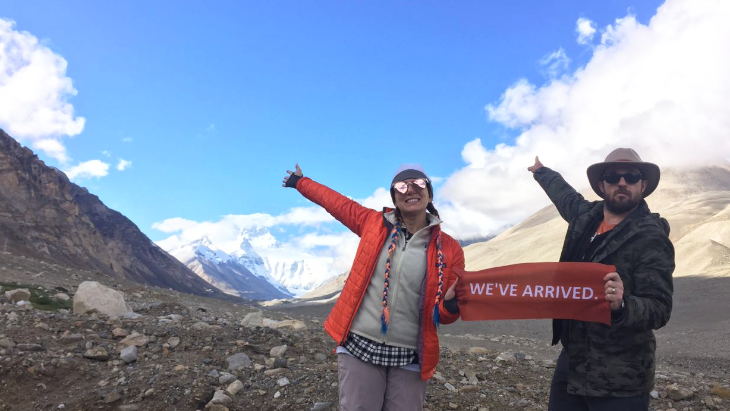
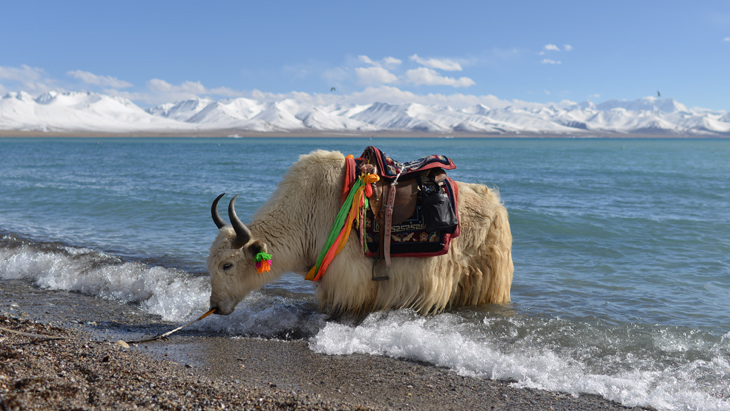
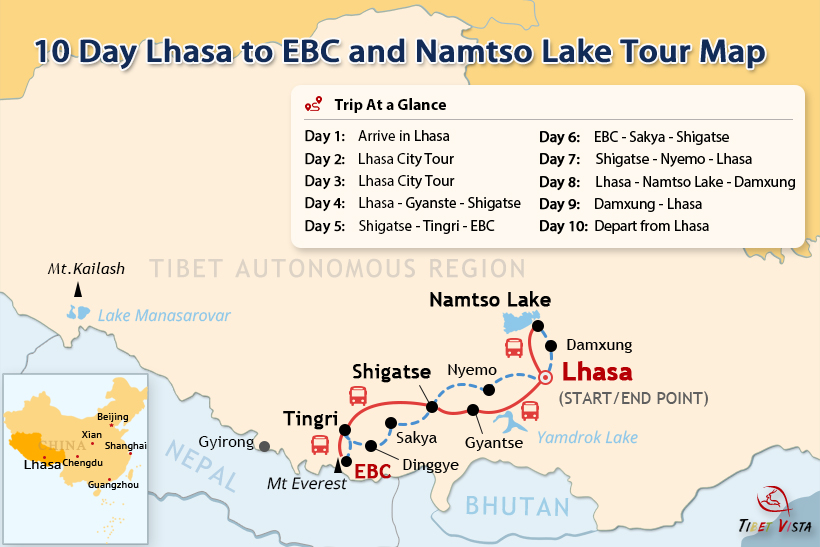
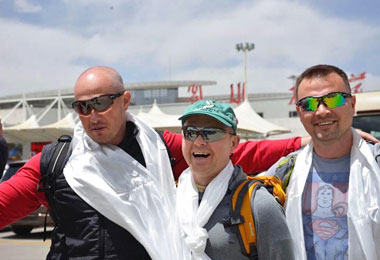
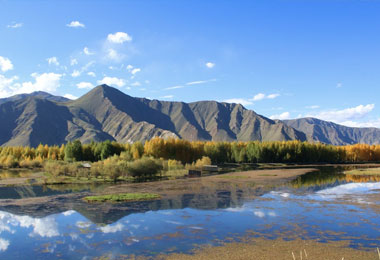

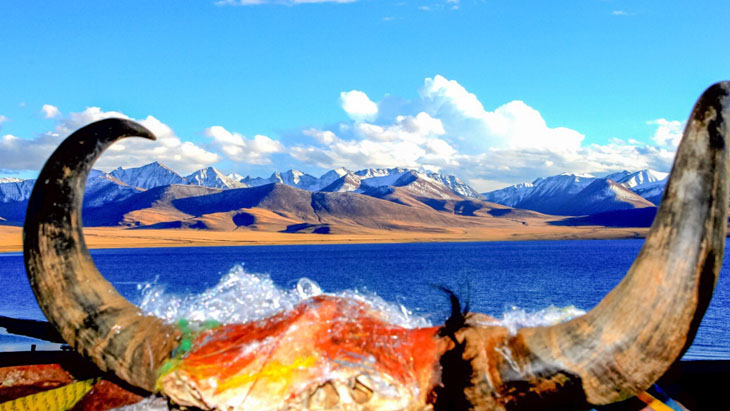
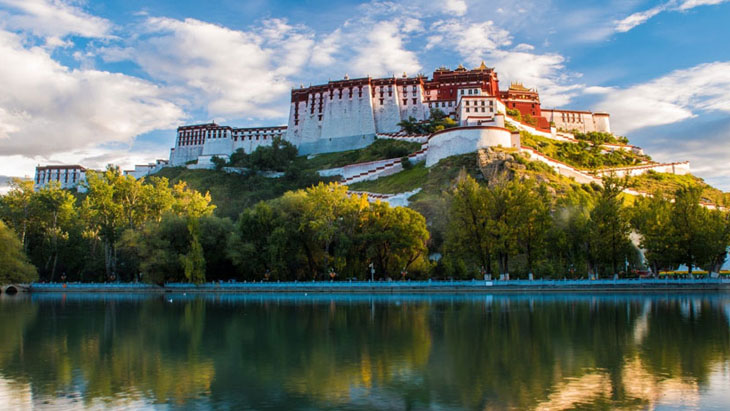
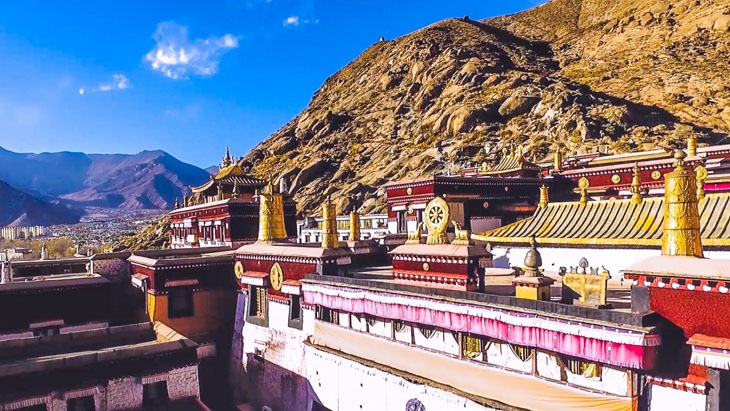
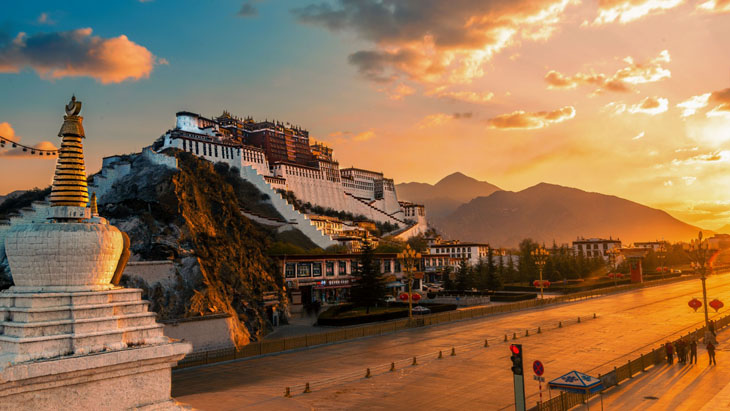
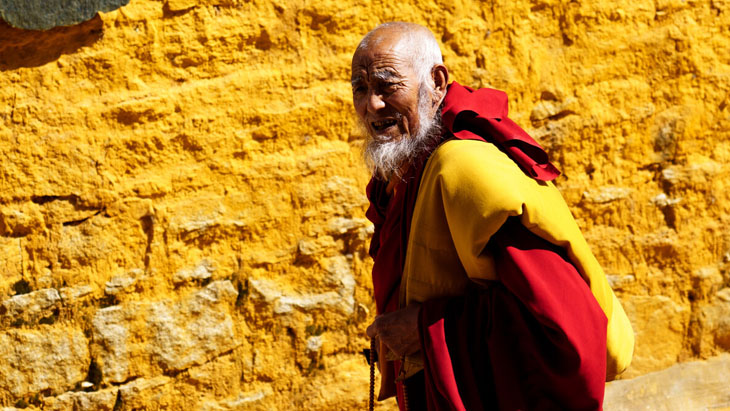





















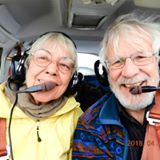

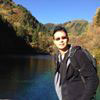



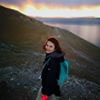

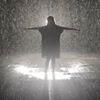
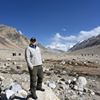
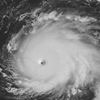










34 Comment ON "10 Days Lhasa to Everest Base Camp and Namtso Lake Small Group Tour"
Asked by Ke** from Singapore
Cycling Tour to Mt Kailash
Hi , we are planning a Cycling Trip once Tibet opens for Tourism. The plan is we shall arrive to Kathmandu , travel to the border and enter via Kerung. Can you pls send a day to day Itinerary starting from Kerung - Lake Manasarovar - Darchen - Asthapath. We shall go around Kailash on foot and resume Cycling back to Kerung. We are a Group of 6-8 persons. Thanks Pls send ur reply to Kevin
Asked by Debo** from USA
Please can you tell me the prices and dates for the Tibet Luxury Tour.
Also, could you please provide a detailed itinerary - I want to see how many hours are spent on buses/vehicles. Thank you! Deborah
Asked by S** from HongKong
Tibet Tour from HK
May I know if holding Mainland Travel Permit for HK Residents. is it also need to get the visa permit to Tibet and what is the procedure if need to apply? Thank you
Asked by Na** from USA
Is Kailash Mansarovar Trip open for Indian Passport Holder?
Is it open for Indian Passport Holder?
Asked by A** from Singapore
Enquiry on private tour
We are planning a trip from Hong Kong to Tibet during the 12th to 21st of April. We want a private tour that covers all the scenic places as well as the EBC. Please advise an itinerary along with the cost breakdown. Thanks.
Asked by Na** from Canada
We would like to take the train from Xining to Lhasa
Asked by Gr** from Canada
The "Tibet Entry Permit" should be apply
Asked by Tam** from Singapore
Sightseeing Potala Palace
Asked by Ka** from Singapore
plan to travel to Mount Kailash
Asked by Nyen** from India
Lhasa potala place visit and monastery visit
Lhasa potala place visit and monastery visit, we are three people and 2 adults and 1 infant 2 Indian Passport and 1 Nepal passport. we have applied for a China visa also.